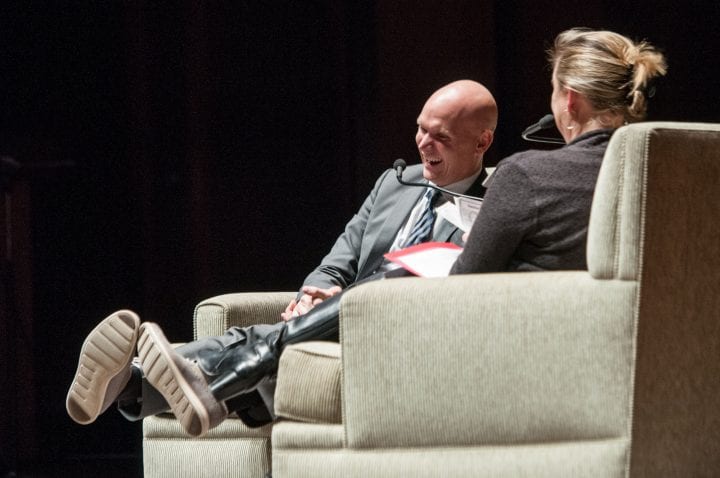
An Intimate Evening with Tony
December 7, 2015
By Christina Gould, Patron Services Manager
I shared “my boyfriend” with a sold out crowd at Benaroya Hall on November 18th. I would have been too shy to have a one-on-one date with him; being one of over 2500 in the cozy atmosphere of the S. Mark Taper Auditorium suited me just fine.
I first became enamored with Anthony Doerr’s writing in 2007 when I read About Grace, it was achingly beautiful in its lyricism – it was my “first date” with him and I wanted more. I picked up Four Seasons in Rome that same year. His vivid details made me want to jump on a plane and return to Rome; the nuances of the city and its people and of parenthood were luminous and meticulous. And then there was All the Light We Cannot See; as one local bookseller said, you’re missing out if you haven’t yet read this literary piece. His sentences make me pause, think, swoon and cry. The day SAL’s associate director iMessaged me the fantastic news that Anthony Doerr was indeed going to be a part of our Literary Arts Series, I screamed with delight and did a victory dance. From that day forward he was known as my boyfriend around the office.
I nervously and eagerly awaited his entrance. The man can write but can he engage a mass of adoring readers? Oh please, don’t disappoint… I held my breath, and then he seemingly leaped onto the stage, a charming, boyish exuberant personality. He applauded Graeme Richards, the WITS student reader, and re-read the last stanza of his poem, “Paris, Le Canal Saint-Martin,” just in case we missed its beauty. He then read “Vampire Irony,” another student’s poem, just for the sheer joy of it. His spontaneous gesture was genuine and generous. I looked around at the audience faces; they were as enraptured as I. It was going to be a good night.
Doerr‘s lecture was entitled “Some Thoughts on the Importance of Artistic Failure (in 6 parts).” The first slide was a tiny “1” in the middle of a huge screen. It made us laugh. He proceeded with an endearing story of his 7-year-old self that was filled with humor and poignancy. He held us in the palm of his hand; he encouraged audience participation and showed us how our habits prevent us from seeing the whole, and he gave us appalling statistics of classic authors whose works were rejected too many times. He shared how he practices literary liposuction, he explained how it is okay to accept failure, and “…the best you can do is create the thing and then let it go.” He assured us that, “Beauty is not in the result but in the attempt.” He was funny, entertaining, brilliant, self-deprecating, earnest, real and attentive. In short, the perfect date.